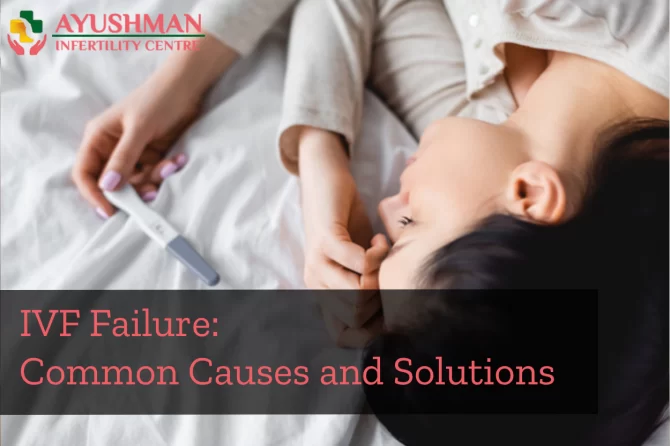
IVF Failure: Common Causes and Solutions
Overview
IVF, or in vitro fertilization, is a treatment designed to assist couples facing infertility in conceiving a child. Although many have successfully used IVF to become parents, some may experience failure, which can be disheartening. Understanding the causes of IVF failure can help couples explore their options and make better-informed choices for their journey ahead.
Reasons for IVF Failure:
- Age of the Woman: Age affects IVF success, with women over 35 facing decreased egg quality and higher risks of chromosomal issues; early intervention can improve outcomes.
- Embryo Quality: High-quality embryos are crucial for IVF success; grading, advanced lab techniques, and genetic testing enhance the chances of a successful outcome.
- Ovarian Response: Ovarian response to fertility drugs varies, affecting egg production; adjusting medication and exploring different treatments with specialist guidance are essential.
- Sperm Quality: Good sperm quality is vital for IVF success; semen analysis and techniques like ICSI, along with genetic testing, can improve fertilization and outcomes.
- Uterine Issues: Uterine health impacts IVF success; conditions like fibroids or a thin lining can hinder implantation, and diagnostic tests and treatments can improve chances.
- Genetic Factors: Genetics significantly affect IVF success; preimplantation genetic testing helps identify viable embryos, enhancing outcomes with the support of genetic counseling.
- Lifestyle Factors: Lifestyle choices like smoking and obesity can lower IVF success; a balanced diet, regular exercise, and stress management improve fertility and success rates.
- Timing of Embryo Transfer: Precise timing of embryo transfer to match uterine readiness and hormone levels is crucial for IVF success, requiring accurate monitoring and skilled care.
- Implantation Issues: Implantation challenges, even with healthy embryos, may involve immune system factors; diagnostic tests and treatments can help improve chances.
- Unexplained Fertility: IVF failure sometimes falls under unexplained infertility, requiring different treatment approaches; patience and hope are key as each attempt refines strategies.
What Happens To Your Body After Failed IVF?
A failed IVF can affect your body in several ways. Here’s what you might experience. If these symptoms worsen, it’s important to consult your doctor on time:
- Hormonal Shifts: After IVF, hormonal decreases may cause mood swings, irritability, and physical changes like hot flashes, with a gradual return to balance over time.
- Abdominal Sensations: Post-IVF bloating and cramping are common; rest, hydration, and avoiding heavy exercise can help, with over-the-counter pain relief if needed.
- Menstrual Changes: You might experience delays or changes in flow and cramping post-IVF; these are due to hormonal fluctuations and should normalize with time.
- Breast Sensitivity: Hormone treatments may cause tender, swollen breasts; wearing a supportive bra and reducing caffeine can alleviate discomfort.
- Fatigue: Extreme tiredness is common after IVF; prioritize rest, engage in light exercise, and maintain a balanced diet to support recovery.
- Weight Variations: Hormone treatments and stress may lead to weight changes; focus on balanced nutrition, hydration, and limiting salt to stabilize weight.
- Vaginal Discharge: Increased discharge, sometimes clear or slightly bloody, is a normal part of hormonal adjustments; use panty liners for comfort and consult your doctor if there’s a foul odor.
- Spotting or Bleeding: Light spotting after a failed IVF is usually due to hormonal changes; seek medical advice if bleeding is heavy or persistent.
- Ovarian Hyperstimulation Syndrome (OHSS): OHSS, though rare, can cause severe bloating, pain, weight gain, and shortness of breath; seek medical attention if symptoms are severe.
- Digestive Concerns: Hormonal changes and stress can cause constipation or diarrhea; high-fiber foods, hydration, and probiotics can help, with a doctor’s consultation if problems persist.
What to Do After a Failed IVF Cycle?
Facing three failed IVF cycles is tough, but it’s a chance to reassess. Meet with your fertility specialist to review your case and explore adjustments that might improve your chances. Additional tests could uncover underlying issues. Don’t forget the importance of emotional support during this time.
Allow your body some time to recuperate. Natural conception might still be a possibility, so discuss this option with your doctor. If you decide to pursue IVF again, ensure you’re in optimal physical and emotional condition.
Embracing a healthy lifestyle can greatly impact your results. Focus on a balanced diet, regular exercise, and stress management through techniques like relaxation and mindfulness. Acupuncture might also be beneficial. Explore other fertility options such as donor eggs or sperm, surrogacy, and adoption. Keeping an open mind and maintaining hope is essential as you navigate this journey.
For those considering their next steps, Ayushman Infertility Centre in Delhi offers expert care. Their team specializes in diagnosing the root causes of IVF failures and provides advanced, personalized treatments. With compassionate support and state-of-the-art technology, they are dedicated to helping you achieve a successful pregnancy.

Thank you for sharing such an insightful post about Fertility. I completely agree with your points about IVF Related Issue. As someone passionate about supporting individuals and couples on their fertility journey, I found this post incredibly helpful. For those looking for expert advice and a supportive community, I highly recommend checking out Fertility Dost :https://www.fertilitydost.com —they provide comprehensive resources and guidance for fertility-related concerns. Keep up the great work!
Reply